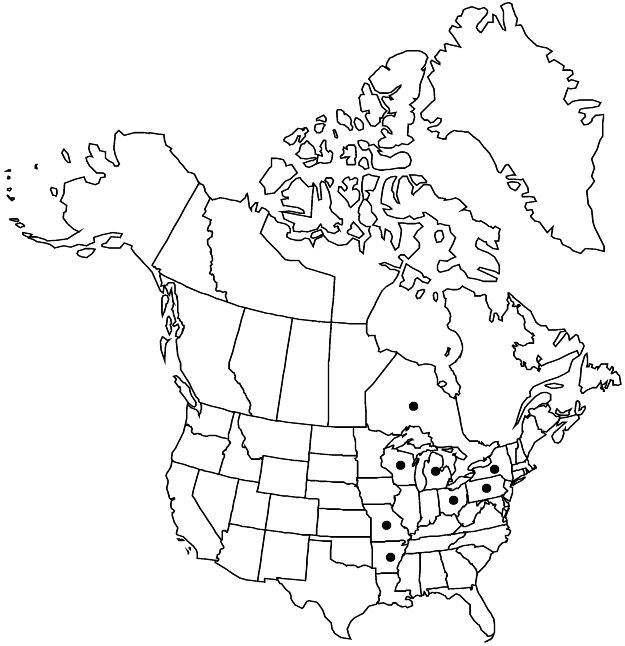Crataegus pruinosa var. virella
Publ. Bot. Milwaukee Public Mus. 3: 181. 1965.
Shrubs or trees, 30–70 dm, larger often single-trunked. Leaves: blade short-ovate to nearly deltate, sometimes ± ovate, 3–4(–5) cm widest proximal to middle, sometimes near base, length/width = 1.1–1.2, lobes 3 or 4 per side, sinuses shallow, lobe apex acute, base truncate to weakly subcordate (basal corners of leaf rounded), adaxial surface sparsely short-hairy young, usually glabrescent. Inflorescence branches glabrous, sometimes sparsely villous. Flowers 15–22 mm diam.; stamens 20, anthers pale pink.
Phenology: Flowering Apr–May; fruiting Sep–Nov.
Habitat: Brush, open woodlands
Elevation: 50–300 m
Distribution

Ont., Ark., Mich., Mo., N.Y., Ohio, Pa., Wis.
Discussion
Variety virella is scattered from Arkansas and Missouri to Wisconsin and to Pennsylvania and New York.
The adaxial leaf surface of var. virella is hairy, at least when young. This variety sometimes has hairy pedicels while the leaf blades are among the smallest of the Crataegus pruinosa group; its most commonly found form in recent years, from Missouri to Wisconsin, has proportionately very wide leaves. These are the typical form. The most extreme type possibly belonging to var. virella, the rare C. aspera Sargent [C. mackenziei var. aspera (Sargent) E. J. Palmer] from Missouri, differs by its hairy pedicels, a scabrous hairy adaxial leaf surface as well as permanently densely hairy petioles and veins on abaxial leaf surfaces. It is so densely hairy that it might well pass for C. biltmoreana (ser. Intricatae). However, C. mackenziei var. mackenziei and C. decorata Sargent, usually placed here, possess only scattered hairs on the adaxial surfaces of the young leaves plus some more persistent hairs along the major veins of adaxial surfaces; they are synonymized under var. rugosa and var. pruinosa, respectively.
Selected References
None.